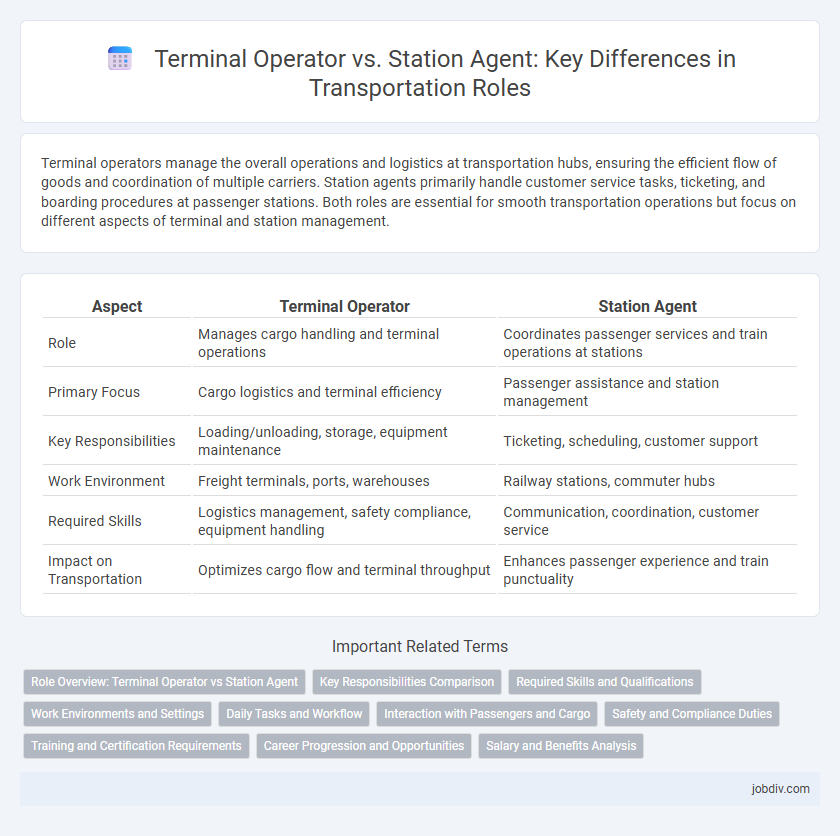Terminal operators manage the overall operations and logistics at transportation hubs, ensuring the efficient flow of goods and coordination of multiple carriers. Station agents primarily handle customer service tasks, ticketing, and boarding procedures at passenger stations. Both roles are essential for smooth transportation operations but focus on different aspects of terminal and station management.
Table of Comparison
| Aspect | Terminal Operator | Station Agent |
|---|---|---|
| Role | Manages cargo handling and terminal operations | Coordinates passenger services and train operations at stations |
| Primary Focus | Cargo logistics and terminal efficiency | Passenger assistance and station management |
| Key Responsibilities | Loading/unloading, storage, equipment maintenance | Ticketing, scheduling, customer support |
| Work Environment | Freight terminals, ports, warehouses | Railway stations, commuter hubs |
| Required Skills | Logistics management, safety compliance, equipment handling | Communication, coordination, customer service |
| Impact on Transportation | Optimizes cargo flow and terminal throughput | Enhances passenger experience and train punctuality |
Role Overview: Terminal Operator vs Station Agent
Terminal operators manage cargo handling, storage, and logistics within shipping terminals, ensuring efficient vessel loading and unloading while coordinating with port authorities and transport providers. Station agents oversee passenger services, ticketing, and train operations at railway stations, facilitating smooth boarding processes and customer support. Both roles require strong organizational skills but focus on distinct aspects of transportation infrastructure--freight management for terminal operators and passenger service for station agents.
Key Responsibilities Comparison
Terminal operators manage cargo handling, storage, and logistics coordination within port or terminal facilities, ensuring efficient loading and unloading processes. Station agents oversee passenger services, ticketing, and train dispatch operations at rail or bus stations to provide smooth transit experiences. Both roles require strong organizational skills but focus on distinct aspects of transportation logistics and customer interaction.
Required Skills and Qualifications
Terminal operators require strong logistical management skills, knowledge of cargo handling procedures, and proficiency in safety regulations to efficiently oversee terminal activities. Station agents must possess excellent customer service abilities, communication skills, and familiarity with ticketing systems and train schedules for effective station operations. Both roles demand problem-solving capabilities and attention to detail, but terminal operators emphasize operational oversight, while station agents focus on passenger service.
Work Environments and Settings
Terminal operators typically work in large-scale freight terminals, ports, or logistics hubs where they manage cargo handling, equipment, and terminal operations, often in outdoor or industrial settings with heavy machinery and vehicles. Station agents are commonly found in passenger railway stations or bus depots, working indoors to assist travelers, handle ticketing, and coordinate train or bus schedules in customer-oriented environments. The work of terminal operators is more physically demanding and industrial, while station agents focus on customer service and operational coordination within transit stations.
Daily Tasks and Workflow
Terminal operators manage cargo handling, equipment coordination, and scheduling to ensure efficient loading and unloading at shipping terminals. Station agents focus on passenger services, ticketing, and train dispatching, maintaining communication with train crews and managing daily train schedules. Both roles require real-time problem-solving and coordination but differ in operational scope and stakeholder engagement.
Interaction with Passengers and Cargo
Terminal operators oversee the loading, unloading, and storage of cargo, ensuring efficient handling and safety protocols at transport hubs. Station agents primarily manage passenger services, including ticketing, boarding assistance, and real-time travel information. Both roles require effective communication skills, but terminal operators focus more on cargo logistics, while station agents emphasize direct passenger interaction.
Safety and Compliance Duties
Terminal operators oversee the safe handling and storage of cargo, ensuring strict compliance with regulatory standards such as OSHA and DOT to prevent accidents and environmental hazards. Station agents manage passenger safety by enforcing transportation security protocols, monitoring boarding procedures, and maintaining adherence to federal and local transit regulations. Both roles require comprehensive training in safety procedures and continuous compliance audits to uphold operational integrity and minimize risks.
Training and Certification Requirements
Terminal Operators must complete comprehensive training programs covering cargo handling, safety regulations, and equipment operation, often requiring certifications such as OSHA or equivalent safety standards to ensure regulatory compliance and operational efficiency. Station Agents undergo specialized training in customer service, ticketing systems, and operational protocols, with certifications typically focused on transportation regulations and safety procedures relevant to passenger and freight management. Both roles demand ongoing education to stay updated with industry standards and technological advancements, ensuring proficient and compliant transportation operations.
Career Progression and Opportunities
Terminal operators manage cargo handling, oversee loading processes, and coordinate logistics at transportation hubs, positioning themselves for career growth into logistics management or supply chain director roles. Station agents focus on customer service, ticketing, and train or bus dispatch operations, providing pathways to supervisory or station management positions. Both roles offer unique progression opportunities, with terminal operators advancing into operational leadership and station agents evolving into broader transit administration careers.
Salary and Benefits Analysis
Terminal operators typically earn higher salaries compared to station agents due to the increased responsibility of managing cargo handling, equipment, and overall terminal operations. Benefits for terminal operators often include performance bonuses, comprehensive health insurance, and retirement plans, reflecting their critical role in logistics management. Station agents, while earning less, receive benefits like travel allowances, shift differentials, and union protections, optimizing compensation relative to customer service and ticketing responsibilities.
Terminal Operator vs Station Agent Infographic

 jobdiv.com
jobdiv.com